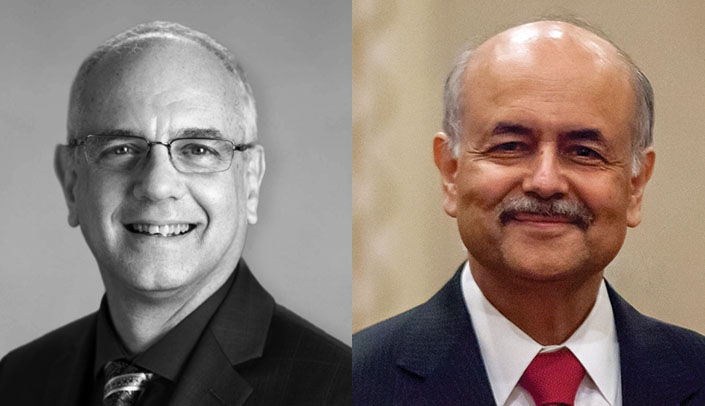Medical knowledge is rapidly expanding. In 1950, the doubling time was 50 years; today, it is 73 days. That makes it difficult for health care professionals to stay abreast of new information, which can impact patient care.
William Kassler, MD, uses big data, advanced analytics and augmented intelligence (AI) to tackle the world’s most pressing health challenges.
As chief medical officer for government health and human services at IBM Watson Health, he recently presented “AI in health care: Are we ready?” during UNMC’s Breakthrough Thinking Conference series, which is designed to challenge and inspire participants to creatively solve problems.
Each individual, Dr. Kassler said, generates 12 terabytes of information in their lifetime — the equivalent of more than 100,000 copies of War and Peace.
So, is AI — the simulation of human intelligence in machines programmed to think like humans — the solution to help manage that data? It already is, Dr. Kassler said, in many high-stakes decision-making applications, including health care. But, while its potential is great, bias in AI health care can unintentionally cause harm, he said, especially if an algorithm is commercialized. Dr. Kassler cited a seminal paper published by Ziad Obermeyer that examined racial bias in algorithms used to manage the health of populations.
To address that, he recommends designating a lead AI ethics official, having clinicians at the table, embracing recognized standards and testing for bias.
In closing, Dr. Kessler cited an 1821 quote from British physician John Forbes, in which he questioned whether the stethoscope would achieve ubiquitous use. “AI will become the stethoscope of the future,” Dr. Kessler said. “Machines will take pieces of care but will not ever replace the clinician.”
See Dr. Kassler’s presentation.
The March 30 Breakthrough Thinking Series also featured Ajit Sachdeva, MD, director of the division of education for the American College of Surgeons, who presented “Transformative Surgical Education and Training: Innovations, Collaboration and Continuous Improvement.”
Dr. Sachdeva outlined the need for continuous practice-based learning and improvement in surgery, and noted that similar to personalized medicine for patients, there is the need for personalized education for providers.
“We are at a crossroads,” he said. “We have a rich tradition in surgery and solid foundation in surgical training, but the world has changed and science and technology has changed. We need to keep all that in mind so we can carve out the best future for ourselves and most importantly for our patients and patient care.”
To ensure best outcomes, Dr. Sachdeva advocated for training programs, including simulation education, that address specific needs during the career progression of surgeons and interprofessional teams.
“We need to go beyond competence,” he said. “We need proficiency, which leads to expertise and mastery, which is the aspirational goal of all practitioners.”
See information on this year’s final Breakthrough Thinking Series session on April 7 at 10 a.m.
